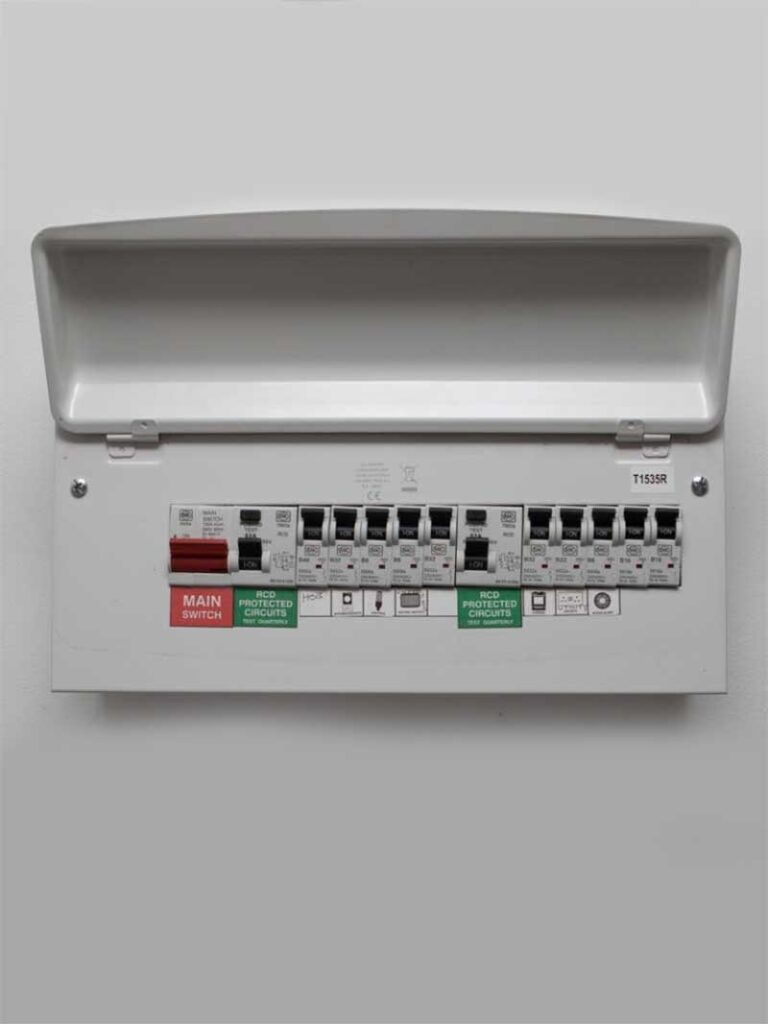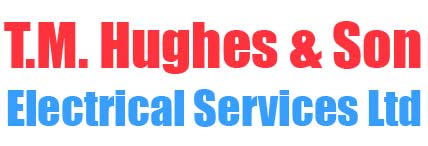
Part of the Hughes empire I know have Hughes looking after my electrical heating and plumbing.
Problems with any of them get a 24 hr response from company that knows my requirements and can solve any problems that occur quickly and expertly
One stop shop as they say
Would highly recommend.
Quick response and good workmanship
Thanks
Are you in need of a new Consumer Unit and live in the Rayleigh area? Then, you have come to the right place.
We are TM Hughes & Son Electrical Services Ltd. We offer a range of electrical services, including Consumer Unit Installation.
Our team of fully insured and experienced NICEIC-registered Electricians will install your new Consumer Unit to a high standard.
Consumer Units: An Overview
A Consumer Unit, also known as a fuse box or distribution board, is an essential component of every home’s electrical system, ensuring electrical safety and efficient energy distribution to individual circuits while protecting against electrical faults.
The Consumer Unit serves as the first line of defence, ensuring your home’s and its occupants’ safety from electrical hazards.
Components Of A Consumer Unit
A consumer unit typically consists of the following components.
- Main Switch: The main switch is the central control that allows you to disconnect the entire electrical supply to your home. It is essential for maintenance and emergencies when you need to cut off power immediately.
- Circuit Breakers: Circuit breakers are protective devices designed to automatically switch off electrical circuits in case of an overload or short circuit. Doing so prevents damage to electrical equipment, reduces the risk of electrical fires, and protects the wiring system within your home.
- Residual Current Devices (RCDs): RCDs are safety devices that rapidly cut off power when they detect an imbalance in the electrical current flow. They protect against the risk of electrocution and electric shock, particularly when a live wire comes into contact with a person or a conductive surface.
- Residual Current Breakers with Overcurrent protection (RCBOs): RCBOs combine RCDs and circuit breakers. They protect against electrical faults (overloads and short circuits) and residual current imbalances. This dual functionality makes them an increasingly popular choice in modern consumer units.
- Fuses (in older Fuse Boxes): If you have a traditional Fuse Box, you will find fuses instead of circuit breakers. Fuses contain a wire that melts when exposed to excessive current, breaking the circuit and preventing further damage. However, fuses must be replaced once they have “blown,” while circuit breakers can be reset.
- Busbars: Busbars are metal bars that are a common connection point for multiple circuits within the consumer unit. They distribute power from the main switch to the individual circuit breakers or fuses.
- Terminal Blocks: Terminal blocks connect the wires from individual circuits to the corresponding protective devices (circuit breakers or fuses) within the consumer unit.
- Surge Protection Device (optional): Some consumer units may include a surge protection device, which safeguards your electrical system and appliances from voltage spikes and power surges.
- Metal casing: Modern Consumer Units are constructed from fire-resistant non-combustible metal.
Benefits Of Upgrading Your Consumer Unit
Upgrading offers several benefits if you have an old Consumer Unit or traditional Fuse Box.
Enhanced Electrical Safety
Upgrading your consumer unit to a modern, RCD-protected unit improves your home’s electrical safety. RCDs and circuit breakers protect against electrocution, electrical fires, and other hazards.
Compliance With Current Regulations
Older consumer units may need to comply with current electrical safety regulations. Upgrading ensures that your home’s electrical system meets the latest standards, such as the IET Wiring Regulations (BS 7671).
Improved Energy Efficiency
A modern consumer unit can help you optimize your home’s energy efficiency by enabling better control over circuits and facilitating the integration of energy-saving devices.
Easier Fault Detection And Resolution
An upgraded consumer unit simplifies identifying and resolving electrical faults, thanks to its clearly labelled circuits and readily accessible components.
Future-Proofing Your Electrical System
Upgrading your consumer unit allows for the seamless integration of new technologies, such as electric vehicle charging points, smart home systems, and renewable energy sources.
Choosing The Right Consumer Unit
We offer free, no-obligation surveys and quotes to determine the best Consumer Unit for your home and electrical system.
Assessing Your Home’s Electrical Needs
Before selecting a consumer unit, evaluating your home’s electrical requirements is essential. Consider the number of circuits, the types of appliances you use, and any future expansion plans.
Selecting The Appropriate Type Of Consumer Unit
Choose a consumer unit type based on your home’s specific needs and the level of protection you desire. High Integrity Consumer Units are generally the best option for most homes, offering a versatile and safe solution.
Considering Additional Features And Functionalities
Some consumer units come with extra features, such as surge protection. Consider whether these functionalities add value and align with your needs.
Consumer Unit Installation Process
Always hire a qualified, licensed Electrician for consumer unit installation. DIY or unqualified installations can lead to safety hazards and non-compliance with regulations.
Rest assured, when you use TM Hughes & Son, your Consumer Unit will be installed to a professional, safe and legal standard.
Initial Inspection And Assessment
Before installation, our Electrician will thoroughly inspect your home’s electrical system. This assessment helps identify potential issues, ensures compatibility with your chosen consumer unit, and allows our Electrician to provide an accurate quote.
Installation Procedure
- Preparation and safety measures: Our Electrician will begin by shutting off the main power supply to your home, ensuring a safe working environment.
- Removing the old unit: Our Electrician will carefully disconnect and remove the old unit.
- Installing the new consumer unit: Our Electrician will mount the new unit, ensuring it’s securely attached and complies with safety regulations.
- Connecting circuits and testing: Our Electrician will connect individual circuits to the new unit and perform comprehensive tests to verify proper functioning and safety.
Post-Installation Inspection And Certification
After installation, our Electrician will conduct a final inspection and issue either an Electrical Installation Certificate (EIC) or Minor Electrical Installation Works Certificate (MEIWC), depending on the nature of the work.
These documents are proof of compliance with safety regulations and may be required for insurance purposes.
Contact Us Today
Please get in touch using the phone number or form below to book a free no-obligation survey and quote for your new Consumer Unit.

Hi, I’m Terry, the founder and owner of TM Hughes & Son Electrical Services
Please get in touch to book an appointment or receive a free, no-obligation quote
Call: 01268 351560
TM Hughes & Son Electrical Services Ltd
The Work Lab
Claydons Lane
Rayleigh
SS6 7UP



